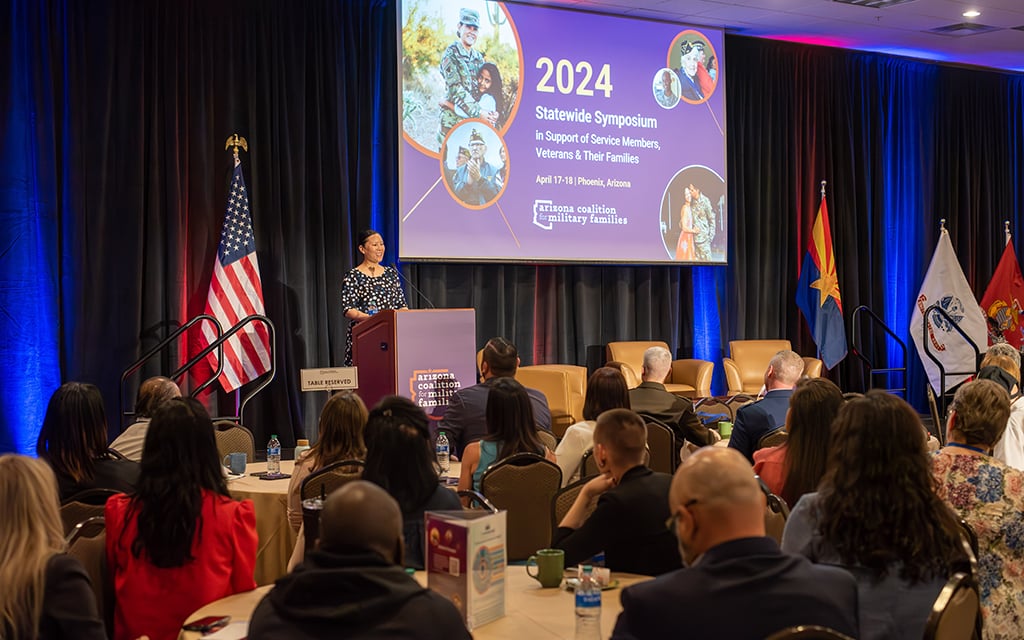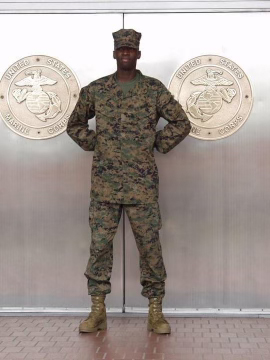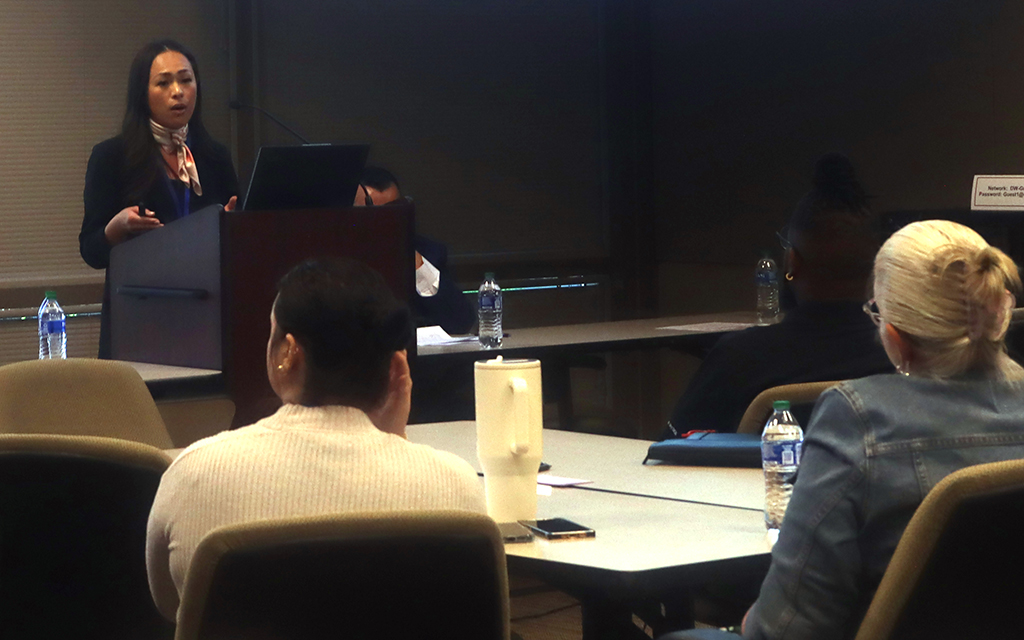
Nicola Winkel, project director at Arizona Coalition for Military Families, speaks during the general session of the Arizona Coalition for Military Families’ 14th Annual Statewide Symposium in Phoenix on April 17. (Photo by Ashley Schulte/Arizona Coalition for Military Families)
PHOENIX – Suicide prevention was a key focus of the Arizona Coalition for Military Families’ 14th Annual Statewide Symposium held in Phoenix on April 17 and 18. The symposium brought together military, government and community resources to focus on strengthening services and support for the half-million veterans who live in Arizona and their families.
In 2021, 6,392 veterans were among the 46,412 suicides among U.S. adults, according to the Department of Veterans Affairs. Between the years 2015 and 2019, veteran suicides accounted for 20.6% of the suicides in Arizona.
“Most of us who are here at the symposium have been touched by that experience, and it is tragic on all levels,” said Thomas Winkel, director of the Arizona Coalition for Military Families. “It has a ripple effect across generations. It impacts us not just for days, weeks, months, but years and decades.”
“Anything that we can do to stop it, even one, is a worthy effort.”
One veteran who participated in a breakout room discussion on veteran suicide prevention was former Marine Corps Staff Sgt. LaDarrin Morris. Morris joined the Marines in 2009 at age 17 and served for 10 years before being honorably discharged in 2019. He now works as an employment counselor in the disabled veterans outreach program for the Arizona Department of Economic Security.

LaDarrin Morris, when he was a Marine Corps staff sergeant, spoke about suicide prevention at the Arizona Coalition for Military Families’ 14th Annual Statewide Symposium in Phoenix on April 17. (Photo courtesy of LaDarrin Morris)
Morris was diagnosed with post-traumatic stress disorder (PTSD) in 2020 after experiencing episodes of sadness toward the end of his service. He said he first sought treatment because his wife – his girlfriend at the time, who was a social worker housing homeless veterans – recognized his mental health struggles and recommended he seek help.
Not only did Morris have to deal with suicidal thoughts due to his PTSD, but one of his friends who also served in the Marine Corps took his own life.
One of the speakers on veteran suicide prevention was Natalie Bui, a supervisory social worker for the VA. Bui, who oversees community engagement and partnerships for suicide prevention, led a discussion on the department’s suicide prevention 2.0 model. The Veterans Health Administration (VA) identified suicide as the 13th-leading cause of death for veterans in 2021.
After telling participants about this and other statistics, Bui described resources available for veterans struggling with suicidal ideation, referring to them as “anchors of hope.” One of the anchors is the utilization of VA’s services.
“We have seen numbers that if you are engaged with the VA, receiving services in any capacity, receiving benefits in any capacity, your risk factors for suicide significantly decrease,” Bui said.
Other anchors Bui mentioned included social programs such as Be Connected, a social program that connects veterans and families to support services; programs that help veterans through transitional periods; and efforts to limit access to lethal weapons for veterans suffering from suicidal thoughts.
Other speakers at the symposium who discussed suicide prevention included Brock Pennington, a community liaison at El Dorado Springs Behavioral Health; Brandon Maloney, program director for Reach for It of Tucson; and Cynthia Olórtegui, a regional account manager for Veterans Services at Universal Health Services.
“We recognize that suicide is not just preventable, but the real way that we’re going to address it is if we take the clinical, the community, marry them together, and we work on pushing … those efforts out together,” Bui said about the VA’s current prevention strategy.
That strategy has three priorities: identifying and screening service members, veterans, and their families for suicide risk; promoting connectedness and improving care transitions; and increasing safety regulations regarding access to lethal means, according to Bui.

Natalie Bui leads a discussion on suicide prevention at the Arizona Coalition for Military Families’ 14th Annual Statewide Symposium in Phoenix on April 17. (Photo by Brooke Rindenau/Cronkite News)
Another breakout session of the symposium discussed “postvention,” which is the support given to friends and family members of veterans who lost their lives to suicide.
Morris suffered guilt from not recognizing that his friend needed help: “My friend is not doing well and he’s trying to reach out to me. No, I got kind of absorbed in myself.”
According to Claire Piazza-Gabriellini, a suicide prevention coordinator for the Phoenix VA, losing a loved one to suicide can make a person start to isolate and suffer from depression themselves, which are suicide warning signs to look out for.
A common resource for people who have lost loved ones to suicide is support groups.
“The main part of our Survivors of Suicide program is having support groups. However, they are peer support groups,” said Stefanie Cary, La Frontera Empact Suicide Prevention Center crisis transition navigator for the Comprehensive Community Health Program. “We have about 30 volunteers who have lost loved ones to suicide.”
La Frontera Empact Suicide Prevention Center uses these support groups and events such as the Jeremiah Walk and a World Suicide Prevention Day candlelight ceremony, to help people who have lost someone to suicide.
Morris said he wished he, and other struggling veterans like his friend, knew about all the resources earlier. “It’s so many resources that I genuinely did not know existed,” Morris said.
“I wish they did because I would have told my friends to go, I would have went, and these problems that we were having would have been fixed a long time ago.”
If you or someone you know is struggling with thoughts of suicide, the 988 Suicide & Crisis Lifeline is available 24/7. Call or text 988.

